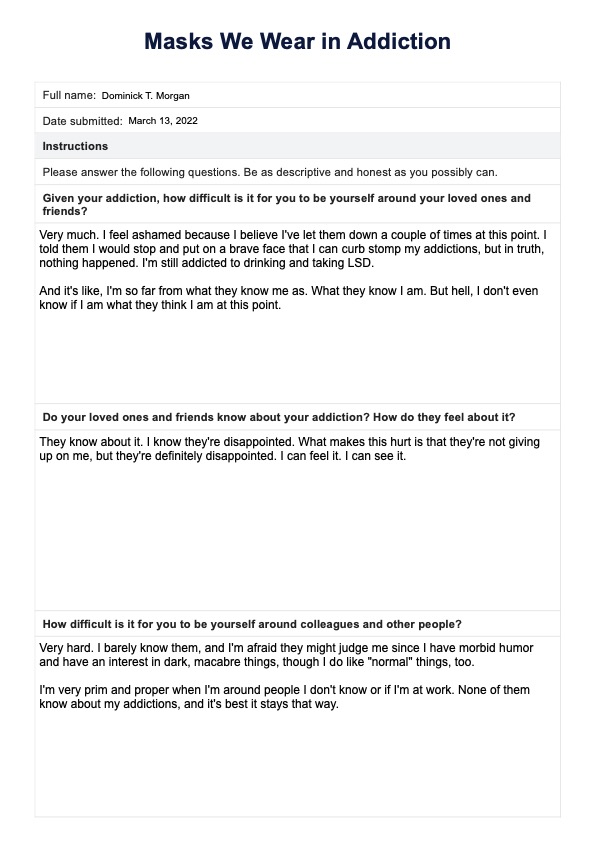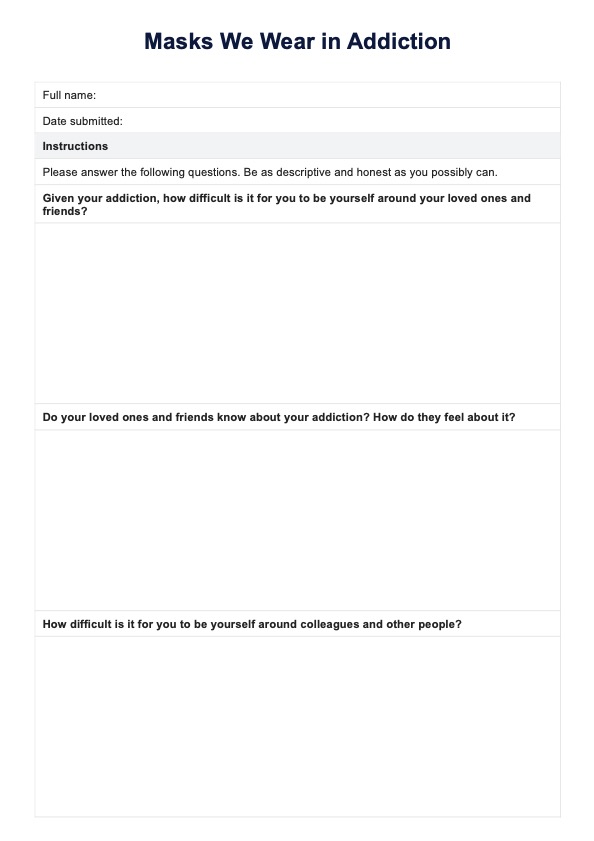Masks We Wear in Addiction PDF Worksheet
Help patients confront the masks they wear related to substance abuse with the Masks We Wear in Addiction PDF Worksheet.


What are personality masks?
People put on personality masks in response to specific situations. Personality masks serve as a defense mechanism. It's normal for people to put on these masks in their daily lives to navigate social situations they would otherwise not want to be part of, cope with traumatic events like bullying or sexual assault, and hide parts of who they really are because they're ashamed of or insecure about their true selves.
Common situations where people put on personality masks
Here are some situations where a person would put on a personality mask:
- When they're taking group therapy
- When they swap between family life and work life
- When they leave their home to spend time in the "outside world"
- When they need to show they're happy and energetic even if their mental health is in shambles
- When they need to hide that they're in pain, even if it's excruciating
- When they need to sound like they're chill with something, even if they're actually quite excited
- When they have an active addiction and are taking substance abuse treatment
It's important to note that while personality masks can serve as a coping mechanism, they can also lead to difficulties in establishing and maintaining authentic relationships, especially in the context of addiction.
Masks We Wear in Addiction PDF Worksheet Template
Masks We Wear in Addiction PDF Worksheet Example
What is a Masks We Wear in Addiction PDF Worksheet?
The Masks We Wear in Addiction PDF Worksheet is designed to help those with alcohol or substance addictions confront the masks they wear. Ultimately, the hope is to have them completely take off these addiction-related masks so they can unlearn maladaptive behaviors and unhealthy patterns. The potential result is the complete discarding of such masks and a rediscovered sense of the authentic self, which can lead to repairing any broken relationships that their addictions caused, the capability to steer clear from alcohol and substances, and regaining the honesty they need to establish new, health, trusting, and meaningful relationships.
When do rehab specialists issue this worksheet?
Rehabilitation specialists normally issue this during the recovery process. Doing so might motivate them to shed their addictions gradually and help them discover their authentic selves again. It's important to do so during recovery because part of recovery is learning to be self-reflexive and confronting problematic behaviors that sprang from addictions.
How to use our Masks We Wear in Addiction PDF Worksheet template
The Masks We Wear in Addiction PDF Worksheet is a writing exercise. If people have difficulty expressing how they feel about themselves through speech, writing might help them articulate themselves.
All they need to do is to answer the following questions as descriptively as they possibly can:
- Given your addiction, how difficult is it for you to be yourself around your loved ones and friends?
- Do your loved ones and friends know about your addiction? How do they feel about it?
- How difficult is it for you to be yourself around colleagues and other people?
- Why do you believe your addictions make it difficult for you to be yourself around people?
- Do you even know what your "true" self is?
- What masks do you wear to conceal your true self?
- How are these masks related to your addictions?
- How do you feel whenever you put on these masks? Do you feel awful? Fake? Scared?
- If you were never to take off your mask(s) and never return to your true self, how would that make you feel?
- If you don't want to lose your true self, what steps would you take to rediscover it?
Their responses in this worksheet can then serve as a jump-off point to encourage reflection and to start a discussion with patients or clients.
Benefits of using this worksheet
It allows rehabilitation specialists to get to know their patients
Since this worksheet is a writing exercise that can help rehabilitation patients become vulnerable, this gives rehabilitation specialists to learn how their patients view themselves, their masks, and their behaviors related to their addictions and the masks they wear. This can help them tailor part of their treatment plan based on their answers, like if they need to undergo cognitive behavioral therapy or similar therapies to help them reconfigure how they think about themselves.
It allows patients to reflect on themselves and set recovery goals
Speaking of how they think about themselves, patients engaging with this worksheet will be able to confront themselves. It's very likely that during the height of their addictions, they never gave themselves the time to reflect on themselves and why they went down the path they did. They will have the opportunity to examine how they really feel about themselves and their addictions, the behaviors they've exhibited and their related consequences, and ultimately, who they really are and want to be.
Commonly asked questions
No. They only become bad when they make people engage in maladaptive behaviors such as deceit, manipulation, and exploitation.
This varies from person to person, but these masks can't be discarded in a single day. It takes a while, and the goal is to gradually peel them as time goes on.
Yes. If a person relapses, they might put on these masks again. Recovery efforts are geared towards discarding these masks and storing them in proverbial boxes, hopefully never to be opened again.





















-template.jpg)


















































































